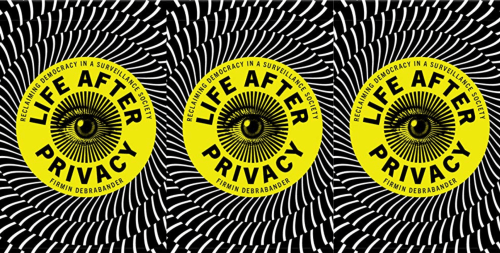
There’s a Twitter account, called Room Rater, that critiques the spaces celebrities, news anchors, and others inhabit during video calls. You might get extra points for interesting bookends or docked for bad lighting. It’s not just those on TV who are being judged for their decor, though. Due to the pandemic, we’re all seeing new sides (and sideboards) of our co-workers during video chats.
This virtual view into our colleagues’ lives is a consequence of the pandemic, but it’s also part of a larger degradation of privacy that’s been happening for years. “It’s only deepened our reliance on all this stuff, and there’s no going back,” Dr. Firmin DeBrabander told Digital Trends.
DeBrabander is a professor of philosophy at the Maryland Institute College of Art. His new book, Life after Privacy: Reclaiming Democracy in a Surveillance Society, makes the case that for most of us, privacy has already vanished. “Initially, I was going to write a book defending privacy, explaining why people should worry about it,” he said. “Then I said, ‘well, forget that.’” Instead, he said, “I ended up writing a book explaining why privacy isn’t important.”
Thoreau’s pondering
DeBrabander started thinking about privacy in 2013, after Edward Snowden leaked documents revealing U.S. intelligence agencies’ surveillance of Americans. The discussions he had with his students about the incident surprised him. “I was really struck by the difference with how — you know, I’m in my 40s, students are in their 20s — how they saw privacy,” he said. “They just did not seem to worry about it. They didn’t care.”
A trip to his mother’s childhood home in Ireland started to change DeBrabander’s thinking. She’d grown up in a three-room house with seven siblings. Try finding a quiet moment in that environment, let alone a private one. “That was like an epiphany,” he said. “Like, this is preposterous.”
Privacy has always been a luxury, for as long as it’s been an ideal. DeBrabander traces some of the idealization of privacy back to Henry David Thoreau and Ralph Waldo Emerson. “Emerson and Thoreau offer an account of individualism that will be essential for privacy advocates: If I am to be a proper individual, robust and self-determining, authentic and in touch with ‘reality,’ I must filter out external influences and prejudices,” he writes. “I must heed only the voice that wells up within – provided I am able and allowed to hear it.”
“I just find that a very dubious claim,” said DeBrabander. “I argue in the book that, you know, who I am is determined in no small degree by my social milieu.” Thoreau is often romanticized as sequestering himself at Walden Pond, but even he went to family dinners, where he probably heard the latest gossip (and then took home leftovers). The modern equivalent of Thoreau might be the man who lives behind a news “blockade,” refusing to read anything about what’s happening in the outside world. It takes a certain level of privacy to achieve that cone of silence, requiring money, space, and self-sufficiency not everyone can afford.
Some modern aspects of privacy assume other factors. A healthy person, for example, doesn’t have to Google symptoms or join a Facebook group for those living with an uncommon disease. And while many people are willing to cede bits of privacy here and there, they’re often willing to give up much more when it comes to health. They wear watches that constantly monitor their heart rate and pay to give companies their DNA samples.
“Given our health crisis in this country, addressing diabetes would be a serious win,” said DeBrabander. “And through digital technology, constant surveillance, the medical establishment believes that they could really take a big chunk out of that. I think people would be willing to do that.”
“Like” it or not
In the 18th century, Jeremy Bentham came up with the idea of the panopticon, a circular structure with cells all around the tower. Prisoners wouldn’t be able to see if someone was in the tower, but the mere chance that they were being watched was supposed to make them behave. DeBrabander thinks social media disproves the theory of the panopticon. People know they’re being watched, but they still behave badly and share relentlessly. Notions of privacy change and are far from universal, but he writes that the idea that sites like Facebook are responding to changing norms and not participating in the alterations themselves is disingenuous.
Despite that mistrust, he’s not sure legal protections will go all that far in safeguarding privacy. “Privacy is really such an incoherent idea in itself,” he said. “It’s really impossible to define, and if it’s impossible to define, how can we hope to legally protect it?”
Smartwatches and voice assistants are supposed to remove the friction from our lives — remembering our appointments for us and letting us ask questions from every room in the house — but DeBrabander thinks that’s the wrong approach. “We need to be building up resources of reflection and thought and care and concern, and paying attention to how people are trying to influence us or how people are trying to manipulate us,” he said.
Trying to game out what social media companies and advertisers are trying to learn about us is a near impossible task, DeBrabander said. “I think the wrong focus is to try and reign them in,” he said. “Because we don’t know how the focus should be on. Instead, how can we withstand their lures and manipulations?”